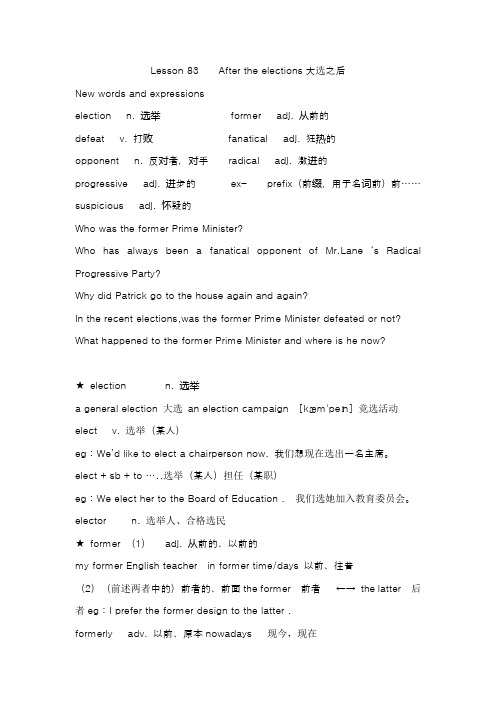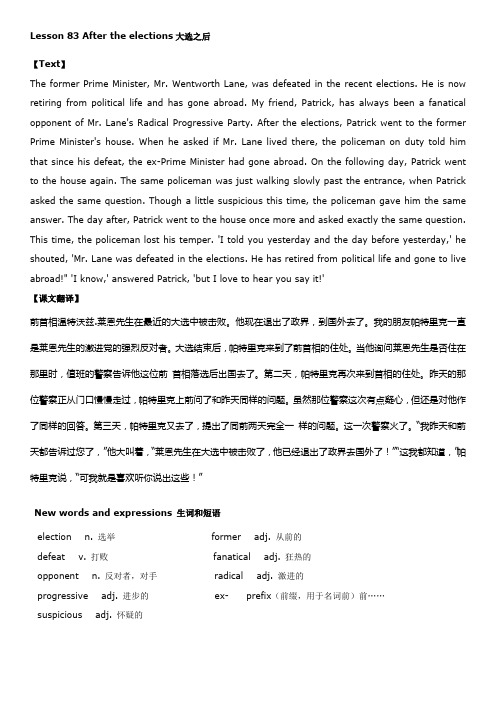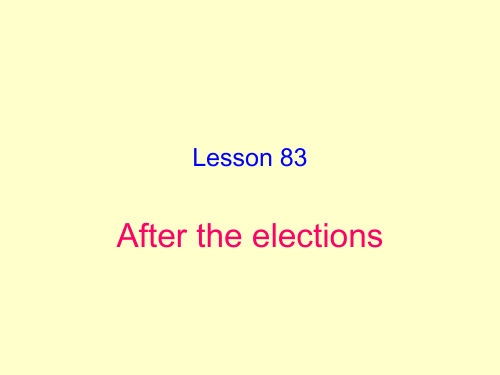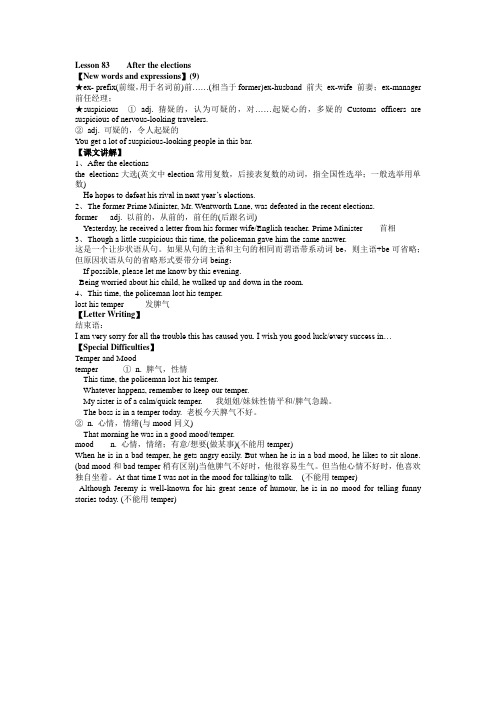新概念英语第二册笔记-第83课
裕兴新概念英语第二册笔记83课

Lesson 83 After the elections大选之后New words and expressionselection n. 选举former adj. 从前的defeat v. 打败fanatical adj. 狂热的opponent n. 反对者,对手radical adj. 激进的progressive adj. 进步的ex- prefix(前缀,用于名词前)前……suspicious adj. 怀疑的Who was the former Prime Minister?Who has always been a fanatical opponent of ne ‘s Radical Progressive Party?Why did Patrick go to the house again and again?In the recent elections,was the former Prime Minister defeated or not? What happened to the former Prime Minister and where is he now?★election n. 选举a general election 大选an election campaign [kæm'peɪn] 竞选活动elect v. 选举(某人)eg:We’d like to elect a chairperson now. 我们想现在选出一名主席。
elect + sb + to …..选举(某人)担任(某职)eg:We elect her to the Board of Education . 我们选她加入教育委员会。
elector n. 选举人、合格选民★former (1)adj. 从前的、以前的my former English teacher in former time/days 以前、往昔(2)(前述两者中的)前者的、前面the former 前者←→the latter 后者eg:I prefer the former design to the latter .formerly adv. 以前、原本nowadays 现今,现在★defeat (2)v. 打败defeat an enemy 战胜敌人、打败敌人eg:Our team defeated our opponent by 5:0.(2)n 挫折、失敗eg:Our baseball team has suffered another defeat .admit defeat 认输a decisive defeat 一個決定性的失敗a crushing[krʌʃ] /total defeat =an utter [ˈʌtə] defeat 彻底失败★fanatical =fanatic(1) adj. 狂热的(2)n.(主义、宗教等)狂信者fan n.(口)迷、热心爱好者a baseball fan 棒球迷be crazy about ……非常喜愛 ..., 醉心于=be mad about …★opponent n. 反对者,对手eg:He best his opponent by three sets to one . 他以三比一击败对手。
新概念英语第2册课程讲义Lesson83

Lesson 83 单词讲解1. election n. 选举elect v.2. former adj. 从前的the former Prime Minister 前首相the former president 前总统3. fanatical adj. 狂热的fan n. 迷fans “粉丝”4. progressive adj. 进步的progress n. / v. 进步,前进,发展make progress in/with …5. suspicious adj. 怀疑的suspect v. 怀疑,猜想n. 嫌疑犯Lesson 83 课文&语法讲解复习课1. The former Prime Minister, Mr. W…, was defeated in the recent elections.同位语被动语态2. My friend, Patrick, has always been a fanatical opponent of … Radical Progressive Party.has been 现在完成时3. When he asked if Mr. Lane lived there, the policeman on duty told him that since his defeat …had gone abroad.宾语从句4. This time, the policeman lost his temper.lose one’s temper5. He has retired from political life and gone to live abroad!He has retired from political life and (he has) gone …!L79:•we were flying low … and (we were) gaining height•the plane turned round and (the plane) flew back…• a flight attendant told us to keep calm and (a flight attendant told us) to get off5. He has retired from political life and gone to live abroad!He has retired from political life and ____ (go) …!L79:we were flying low … and ____ (gain) heightthe plane turned round and ____ (fly) back…a flight attendant told us to keep calm and ____ (get off)Lesson 83 知识拓展复习时态:He is retiring … and has gone abroad.Patrick went to … the … house.The same policeman was walking slowly …I love to hear you say it.时态时vs. 态通过谓语动词的变化来体现共16 种过去现在将来过去将来一般√√√√进行√√完成√√完成进行。
新概念第二册Lesson 83 Aftter the elections讲义

新概念第二册Lesson 83 Aftter the elections一、单词精讲election[i'lekʃən] n.选举引申:可引申为民主进程、政治变革的关键环节,是公民参与政治决策的一种方式,也可表示为获取权力或职位的竞争过程。
搭配:general election(大选);presidential election(总统选举);hold an election(举行选举)。
例句:The general election will be held next month.(下个月将举行大选。
)former ['fɔ:mə]a.从前的引申:可引申为过去的、之前存在的状态或身份,常用来表示与现在相对的过去情况,也可表示以前的人或事物具有某种特定的属性或关系。
搭配:former president(前总统);former colleague(以前的同事);the former(前者,与the latter相对)。
例句:The former champion is now retired.(这位前冠军现在已经退役了。
)词源:源自古英语“forma”,表示“第一的、首要的”,后来引申为“以前的、从前的”。
defeat[di'fi:t] v.打败引申:可引申为战胜困难、克服障碍的意思,不仅仅局限于战胜对手,也可表示使计划、想法等无法实现。
搭配:defeat the enemy(打败敌人);defeat a purpose(挫败一个目的);suffer defeat(遭受失败)例句:Our team defeated their opponents in the final.(我们队在决赛中打败了对手。
)fanatical [fə'nætikəl]a.狂热的引申:可引申为过度热情、极端投入的状态,这种热情可能是对宗教、政治、爱好等方面的过度追捧,甚至失去理智。
新概念第二册-Lesson 83 After the elections

FANATICAL
fanatical /fəˈnætɪkl/ adj. 入迷的, 狂热的 fanatically /fə'nætɪklɪ/ adv. 狂热地, 盲信地 fanatic /fəˈnætɪk/ n. 入迷者, 极端分子, 狂热信徒 adj. 入迷的 E.g. Gary's fanatical about football. 加里对足球很痴迷。 -Cambridge Dictionary
OPPONENT
opponent /əˈpəʊnənt/ n. 对手, 反对者 词根词缀: 词根: pon = put 放置 opponent /əˈpəʊnənt/ n. 对手, 反对者 adj. 反对的 [op-=ob-相反, 对面 + pon放置 + -ent形容词后缀,…的 或名词后缀, 表示人] component /kəmˈpəʊnənt/ adj. 组成的 n. 组成部份, 成分 [com-共同+pon放+-ent形容词后缀,…的或名词后缀, 表示物] compound /ˈkɒmpaʊnd/ n. 混合物, 化合物, 有围栏的场地 *com- 共同 propone /prə'pəʊn/ v. 提议, 建议 *pro- 向前 proponent /prəˈpəʊnənt/ n. 提出者, 倡导者 *-ent 表示人 exponent /ɪkˈspəʊnənt/ n. 指数, 拥护者, 说明者 [ex-出, 外 + pon放, 摆 + -ent形容词后缀,…的/名词后缀] postpone /pəˈspəʊn/ v. 推迟, 延期 [post-后 + pone放] progress /ˈprəʊɡres/ v. & n. 进展, 进步 progressive /prəˈɡresɪv/ adj. 进步的 progression /prəˈɡreʃn/ n. 进展, 发展 E.g. My friend, Patrick, has always been a fanatical opponent of Mr. Lane's Radical Progressive Party. 我的朋友帕特里克一直是莱恩先生的激进党的强烈反对者。
新概念第二册Lesson83 After the elections 大选之后

Lesson83 After the elections大选之后the former….the latter:前者……后者……..1.Who will be e______ next American President?2.Jim and Tom are brothers; the f____ is taller, and the latteris shorter.3.Do you think that Hillary will be d_______ in the PresidentialElection?你认为希拉里在总统选举中会被打败吗?4.Many young people in the Middle East are f_____ supportersof terrorism.在中东,有很多年轻人是恐怖主义的狂热支持者。
5.Higgins d__________ her o_______ in the tennis matchyesterday.昨天辛吉斯在网球比赛中战胜了她的对手。
6.My teacher’s thoughts are always r______.我老师的思想总是激进的7.Lu Xun was a p______ thinker , writer and solider.鲁迅是一个进步的思想家,作家以及战士。
8.Cao Cao was an intelligent politician; his limitation was that he was too s________.9.I used to sleep all day and work at night, but now I am ___ (duty) three days and off two.我以前常常白天睡觉晚上工作,但现在我每值三天班就休息两天。
10.I’m making relatively slow p______ with my French.我的法语进步得相当慢。
新概念第二册83

• Though a little suspicious this time, the policeman gave him the same answer. • though 引导的是让步状语从句 • 完整的从句是: • Though the policeman was a little suspicious this time……. • 如果从句的主语和主句的相同而谓语是系动词be,则 主语+be可省略,但原因状语从句的省略形式要带分词 being: • If possible, please let me know by this evening. • 如果可能的话,请今晚以前告诉我。 • Being worried about his child, he walked up and down in the room.
• • • • • • • •
同位语 同位语
• My friend, Patrick, has always been a fanatical opponent of Mr. Lane's Radical Progressive Party. • Radical Progressive Party. 激进党 • After the elections, Patrick went to the former Prime Minister's house.
• • • • • • • • • • • • • • •
progress (1) n. 前进、进行 (2) n. 进步、上进、发展 医学进展 the progress of medicine 你已经在说英语上取得了很大进展。 You’ve made great progress in speaking English . (3) n.经过、过程、进展 这个病人进步极为显著。 The patient is making remarkable progress. (4) v. 前进、进行、上进、提高 我们的工作現正稳步推进。 We are now progressing steadily with our work . 你在数学上进步很快 You’ve progressed quickly in mathematics .
新概念英语第二册笔记_第83课(最新整理)

Lesson 83 After the elections大选之后【Text】The former Prime Minister, Mr. Wentworth Lane, was defeated in the recent elections. He is now retiring from political life and has gone abroad. My friend, Patrick, has always been a fanatical opponent of Mr. Lane's Radical Progressive Party. After the elections, Patrick went to the former Prime Minister's house. When he asked if Mr. Lane lived there, the policeman on duty told him that since his defeat, the ex-Prime Minister had gone abroad. On the following day, Patrick went to the house again. The same policeman was just walking slowly past the entrance, when Patrick asked the same question. Though a little suspicious this time, the policeman gave him the same answer. The day after, Patrick went to the house once more and asked exactly the same question. This time, the policeman lost his temper. 'I told you yesterday and the day before yesterday,' he shouted, 'Mr. Lane was defeated in the elections. He has retired from political life and gone to live abroad!" 'I know,' answered Patrick, 'but I love to hear you say it!'【课文翻译】前首相温特沃兹.莱恩先生在最近的大选中被击败。
裕兴新概念英语第二册笔记83课.

一般現在時:一般過去時:現在完成時:have / has + p.p.過去完成時:had + p.p.現在完成進行時 : has / have been doing 過去進行時 : were / was v.-ing被動語態:be + p.p.※新東方補充:【Special Difficulties】Temper and Moodtemper①n.脾气,性情This time, the policeman lost his temper.Whatever happe ns, remember to keep our temper.My sister is of a calm/quick temper.我姐姐/妹妹性情平和/脾气急躁。
The boss is in a temper today.老板今天脾气不好。
②n.心情,情绪(与mood同义)That morning he was in a good mood/temper.mood n.心情,情绪;有意/想要(做某事)(不能用temper)Whe n he is in a bad temper, he gets angry easily. But whe n he is in a bad mood, he likes to sit alone. (bad mood和bad temper稍有区别)当他脾气不好时,他很容易生气。
但当他心情不好时,他喜欢独自坐着。
At that time I was not in the mood fortalking/to talk.(不能用temper)Although Jeremy is well-known for his great sense of humour, he is in no mood for telling funny stories today.(不能用temper)【Text】Why did Patrick keep on ask ing the same questio n?The former Prime Min ister, Mr. Wen tworth Lane, was defeated in the rece nt electio ns. He is now retiring from political life and has gone abroad. My friend, Patrick, has always bee n a fan atical opp onent of Mr. Lan e's Radical Progressive Party. After the elections, Patrick went to the former Prime Minister's house. When he asked if Mr. Lane lived there, the policeman on duty told him that since his defeat, the ex-Prime Mini ster had gone abroad. On the follow ing day, Patrick went to the house aga in. The same policeman was just walking slowly past the entrance, when Patrick asked the same question. Though a little suspicious this time, the policeman gave him the same an swer. The day after, Patrick went to the house once more and asked exactly the same question. This time, the policeman lost his temper. 'I told you yesterday and the day before yesterday,' he shouted, 'Mr. Lane was defeated in the elect ions. He has retired from political life and gone to live abroad!"Though the policeman was a little suspicious ths time ......★The day after, Patrick went to the house once more and asked exactly the same questi on. 第三天,帕特里克又去了,提出了同前两天完全一样的问题。
新概念英语第二册笔记_第83课

Lesson 83 After the elections大选之后【Text】The former Prime Minister, Mr. Wentworth Lane, was defeated in the recent elections. He is now retiring from political life and has gone abroad. My friend, Patrick, has always been a fanatical opponent of Mr. Lane's Radical Progressive Party. After the elections, Patrick went to the former Prime Minister's house. When he asked if Mr. Lane lived there, the policeman on duty told him that since his defeat, the ex-Prime Minister had gone abroad. On the following day, Patrick went to the house again. The same policeman was just walking slowly past the entrance, when Patrick asked the same question. Though a little suspicious this time, the policeman gave him the same answer. The day after, Patrick went to the house once more and asked exactly the same question. This time, the policeman lost his temper. 'I told you yesterday and the day before yesterday,' he shouted, 'Mr. Lane was defeated in the elections. He has retired from political life and gone to live abroad!" 'I know,' answered Patrick, 'but I love to hear you say it!'【课文翻译】前首相温特沃兹.莱恩先生在最近的大选中被击败。
新概念英语第二册笔记-第83课汇编

Lesson 83 After the elections大选之后【Text】The former Prime Minister, Mr. Wentworth Lane, was defeated in the recent elections. He is now retiring from political life and has gone abroad. My friend, Patrick, has always been a fanatical opponent of Mr. Lane's Radical Progressive Party. After the elections, Patrick went to the former Prime Minister's house. When he asked if Mr. Lane lived there, the policeman on duty told him that since his defeat, the ex-Prime Minister had gone abroad. On the following day, Patrick went to the house again. The same policeman was just walking slowly past the entrance, when Patrick asked the same question. Though a little suspicious this time, the policeman gave him the same answer. The day after, Patrick went to the house once more and asked exactly the same question. This time, the policeman lost his temper. 'I told you yesterday and the day before yesterday,' he shouted, 'Mr. Lane was defeated in the elections. He has retired from political life and gone to live abroad!" 'I know,' answered Patrick, 'but I love to hear you say it!'【课文翻译】前首相温特沃兹.莱恩先生在最近的大选中被击败。
新概念英语第二册Lesson+83+After+the+elections+大选之后+课文讲义

新概念英语第二册第83课Lesson 83 After the elections 大选之后The former Prime Minister, Mr. Wentworth Lane, was defeated in the recent elections. He is now retiring from political life and has gone abroad. My friend, Patrick, has always been a fanatical opponent of Mr. Lane's Radical Progressive Party. After the elections, Patrick went to the former Prime Minister's house. When he asked if Mr. Lane lived there, the policeman on duty told him that since his defeat, the ex-Prime Minister had gone abroad. On the following day, Patrick went to the house again. The same policeman was just walking slowly past the entrance, when Patrick asked the same question. Though a little suspicious this time, the policeman gave him the same answer. The day after, Patrick went to the house once more and asked exactly the same question. This time, the policeman lost his temper. 'I told you yesterday and the day before yesterday,' he shouted, 'Mr. Lane was defeated in the elections. He has retired from political life and gone to live abroad!"'I know,' answered Patrick, 'but I love to hear you say it!'New words and expressions 生词和短语election n. 选举former adj.从前的defeat v. 打败fanatical adj.狂热的opponent n. 反对者,对手radical adj.激进的progressive adj. 进步的ex- prefix (前缀,用于名词前)前...suspicious adj. 怀疑的参考译文前首相温特沃兹.莱恩先生在最近的大选中被击败。
新概念英语第二册Lesson83

defeat
(1) v. 打败 • 打敗敌人 • defeat an enemy • 我隊以5比零擊敗對手。 • Our team defeated our opponent by 5:0. (2) n 挫折、失敗 • 我們的棒球隊再遭失敗 • Our baseball team has suffered another defeat .
• (2)可疑的,令人起疑的: • You get a lot of suspicious-looking people in this bar. • 你这个酒吧里有许多人看上去很可疑。 • The car crash looks suspicious. • 这个撞车事故看上去可疑。
temper与mood
After the elections, Patrick went to the former Prime Minister's house. • go to 去……地方
• temper指"心情"、"情绪"时,与mood同义: • That morning George was in a good mood/temper. 那天上午,乔治心情好。 • 但bad mood与bad temper稍有区别: • When he is in a bad temper, he gets angry easily. But when he is in a bad mood, he likes to sit alone. 当他脾气不好 时,他很容易生气。但当他心情不好时, 他喜欢独自坐着。
• • • • • • • • • •
progressive (1) adj. 进步的 ←→ conservative a.保守的,守舊的;傳統的 n.保守的人 思想進步的市長 a mayor with progressive ideas 新主席是相當前卫的。 The new chairman is quite progressive . (2) 前進的、進行的 ←→ regressive a.退步的,退化的
新概念英语第二册第83课-After the elections

新概念英语第二册第83课:After the electionsLesson 83 After the elections大选之后First listen and then answer the question.听录音,然后回答以下问题。
Why did Patrick keep on asking the same question?The former Prime Minister, Mr. Wentworth Lane, was defeated in the recent elections. He is now retiring from political life and has gone abroad. My friend, Patrick, has always been a fanatical opponent of Mr. Lane's Radical Progressive Party. After the elections, Patrick went to the former Prime Minister's house. When he asked if Mr. Lane lived there, the policeman on duty told him that since his defeat, the ex-Prime Minister had gone abroad. On the following day, Patrick went to the house again. The same policeman was just walking slowly past the entrance, when Patrick asked the same question. Though a little suspicious this time, the policeman gave him the same answer. The day after, Patrick went to the house once more and asked exactly the same question. This time, the policeman lost his temper. 'I told you yesterday and the day before yesterday,' he shouted, 'Mr. Lane was defeated in the elections. He has retired from political life and gone to live abroad!"'I know,' answered Patrick, 'but I love to hear you say it!'参考译文前首相温特沃兹.莱恩先生在最近的大选中被击败。
新概念英语第二册83课课后习题详细答案

新概念英语第二册83课课后习题详细答案第一篇:新概念英语第二册83课课后习题详细答案新概念英语第二册课后习题答案详解Lesson 83 练习答案 Key to written exercises 1.难点练习答案 He refused to help us and I lost my temper with him.2 They were very rude but I managed to keep my temper.3 He isn't usually in such a good temper on a Monday morning!4 Don't ask him for a rise now.He's in a very bad temper today. 5 She's just won a prize in the lottery, so she's in a very good mood.6 He's just lost a lot of money, so he's in a very bad mood.7 Let's go out.I'm in the mood for a celebration!2.多项选择题答案1.b 根据课文内容可以推测只有b.是正确的,课文所暗示出如果温特沃兹?莱恩先生在最近的大选中获胜,他还会当首相的,但事实上他没有获胜。
只有b.与这一暗示相符,其他3个选择都与课文的内容不符。
2.a 根据课文最后一行but I love to hear it, 可以判断a.是课文所暗示的情形,其他3个选择都与课文含义不符。
3.c 本句的前半部分用的是现在完成时 he has always been a fanantical opponent(他一直是强烈的反对者),后半部分只有用一般现在时才能与前面的时态协调,并合乎逻辑。
新概念第二册lesson83

Lesson 83 After the elections【New words and expressions】(9)★ex- prefix(前缀,用于名词前)前……(相当于former)ex-husband 前夫ex-wife 前妻;ex-manager 前任经理;★suspicious ①adj. 猜疑的,认为可疑的,对……起疑心的,多疑的Customs officers are suspicious of nervous-looking travelers.②adj. 可疑的,令人起疑的Y ou get a lot of suspicious-looking people in this bar.【课文讲解】1、After the electionsthe elections大选(英文中election常用复数,后接表复数的动词,指全国性选举;一般选举用单数)He hopes to defeat his rival in next year’s elections.2、The former Prime Minister, Mr. Wentworth Lane, was defeated in the recent elections.former adj. 以前的,从前的,前任的(后跟名词)Yesterday, he received a letter from his former wife/English teacher. Prime Minister 首相3、Though a little suspicious this time, the policeman gave him the same answer.这是一个让步状语从句。
如果从句的主语和主句的相同而谓语带系动词be,则主语+be可省略;但原因状语从句的省略形式要带分词being:If possible, please let me know by this evening.Being worried about his child, he walked up and down in the room.4、This time, the policeman lost his temper.lost his temper 发脾气【Letter Writing】结束语:I am very sorry for all the trouble this has caused you. I wish you good luck/every success in…【Special Difficulties】Temper and Moodtemper ①n. 脾气,性情This time, the policeman lost his temper.Whatever happens, remember to keep our temper.My sister is of a calm/quick temper. 我姐姐/妹妹性情平和/脾气急躁。
《新概念英语》第二册学习笔记84 83课

《新概念英语》第二册学习笔记84 83课第84课On strike1、The strike is due to begin on Tuesday.be due to 用于表达某一事情将于什么时候发生例句:The committee was due to meet on 22 August.2、No one knows how long it will last.last 动词,持续例句:His speech lasted for exactly fourteen minutes.3、The busmen have stated that the strike will continue until general agreement isreached about pay and working conditions.until 连词,直到......才......例句:You can get free medical care until you are 16.4、This will relieve pressure on the train to some extent.to some extent 在一定程度上例句:To some extent his warnings have proved absolutely correct.5、Even so, people are going to find it difficult to get to work.find it difficult to do sth. 其中的it 是形式宾语,真正的宾语是后面的动词不定式'to get to work'例句:I found it very difficult to write about someone very very close to you.6、Only one or two people have objected that the students will drive too fast!object 此句中是动词,‘反对’,别有名词意思是‘物体’例句:He was carrying a shabby black object.7、一般将来时,表示将来某一时段的动作或者状态,或将来某一时间内经常的动作或状态。
- 1、下载文档前请自行甄别文档内容的完整性,平台不提供额外的编辑、内容补充、找答案等附加服务。
- 2、"仅部分预览"的文档,不可在线预览部分如存在完整性等问题,可反馈申请退款(可完整预览的文档不适用该条件!)。
- 3、如文档侵犯您的权益,请联系客服反馈,我们会尽快为您处理(人工客服工作时间:9:00-18:30)。
Lesson 83 After the elections大选之后【Text】The former Prime Minister, Mr. Wentworth Lane, was defeated in the recent elections. He is now retiring from political life and has gone abroad. My friend, Patrick, has always been a fanatical opponent of Mr. Lane's Radical Progressive Party. After the elections, Patrick went to the former Prime Minister's house. When he asked if Mr. Lane lived there, the policeman on duty told him that since his defeat, the ex-Prime Minister had gone abroad. On the following day, Patrick went to the house again. The same policeman was just walking slowly past the entrance, when Patrick asked the same question. Though a little suspicious this time, the policeman gave him the same answer. The day after, Patrick went to the house once more and asked exactly the same question. This time, the policeman lost his temper. 'I told you yesterday and the day before yesterday,' he shouted, 'Mr. Lane was defeated in the elections. He has retired from political life and gone to live abroad!" 'I know,' answered Patrick, 'but I love to hear you say it!'【课文翻译】前首相温特沃兹.莱恩先生在最近的大选中被击败。
他现在退出了政界,到国外去了。
我的朋友帕特里克一直是莱恩先生的激进党的强烈反对者。
大选结束后,帕特里克来到了前首相的住处。
当他询问莱恩先生是否住在那里时,值班的警察告诉他这位前首相落选后出国去了。
第二天,帕特里克再次来到首相的住处。
昨天的那位警察正从门口慢慢走过,帕特里克上前问了和昨天同样的问题。
虽然那位警察这次有点疑心,但还是对他作了同样的回答。
第三天,帕特里克又去了,提出了同前两天完全一样的问题。
这一次警察火了。
“我昨天和前天都告诉过您了,”他大叫着,“莱恩先生在大选中被击败了,他已经退出了政界去国外了!”“这我都知道,”帕特里克说,“可我就是喜欢听你说出这些!”New words and expressions 生词和短语【生词讲解】1. election n. 选举1) election 指一般选举时用单数,指全国性的选举时用复数:eg:An election will be held next month.下月将举行一次选举。
eg:In America,presidential elections are held every four years.美国总统选举每四年一次eg:He hopes to defeat his rival in next year's elections.他希望在明年的大选中击败对手。
eg:He is standing for election.他是候选人。
elective subjects选修科目a general election 大选an election campaign 竞选活动Election day 选挙日、投票日2) elect v. 选举(某人)eg:He was elected to the Senate (参议院) in the last election.在上次的选举,他当选为参议员。
eg:We’d like to elect a chairperson now.我们想现在选出一名主席。
eg:They elect him as mayor.他们选他当市长3) elect + sb + to …..选举(某人)担任(某职)eg:We elect her to the Board of Education.我们选她加入教育委员会。
4) elector n. 选举人、合格选民2. former1) adj. 从前的、以前的my former English teacher我以前的英语老师in former time = in former days 以前、往昔the former world champion前世界冠军eg:Yesterday, he received a letter from his former wife/English teacher.昨天他收到了他前妻/以前的英语老师的一封信。
2)(前述两者中的)前者的、前面的the former 前者←→ the latter 后者eg:I prefer the former design to the latter .我比较喜欢前者的设计方案,不喜欢后者eg:Kate and Jane are sisters. The former is a pianist ;the latter is a singer .凯特和简是姐妹。
前者是一个钢琴家,后者是一名歌手formerly adv. 以前、原本nowadays 现今,现在eg:Formerly this neighborhood was a poor village .以前这附近是一个贫穷的村庄3. defeat1) v. 打败defeat an enemy 打败敌人, 战胜敌人eg:Our team defeated our opponent by 5:0.我队以5比零击败对手。
eg:The enemy was defeated in a decisive battle.敌人在一场决定性的战斗中被击败。
2) n 挫折、失败eg:Our baseball team has suffered another defeat.我们的棒球队再遭失败admit defeat 认输a decisive defeat 一个决定性的失败a crushing defeat 彻底失败= a total defeat = an utter defeat3) v.困惑,难倒eg:I've tried to solve the problem, but it defeats me.我想解决这个问题,但是把我难倒了* crush [krʌʃ] vt. 压碎,弄皱;镇压,制服,压垮* utter [ˈʌtə] vt. 发出(声音),说a.完全的,绝对的4. fanatical = fanatic1)adj. 狂热的fanatical about sth.eg:She's fanatical about keeping fit.她如痴如醉的注重健美fanatic狂热者2)n.(主义、宗教等)狂信者fan n.(口)迷、热心爱好者a baseball fan 棒球迷; a rock'n'roll fan 摇滚迷be crazy about ……非常喜爱 ..., 醉心于=be mad about …fan letter 影迷或球迷写的崇拜信5. opponent n. 反对者,对手eg:He beat his opponent by three sets to one.他以三比一击败对手。
beat an opponent at an election选举时击败了对手eg:Her opponet left the tennis court in tears.她的对手含泪离开了网球场。
opponent of sth.反对者an opponent of nuclear weapons反对核武器的人oppose v.1)反对、抵抗eg:I oppose your going there alone.我反对你去那里eg:The storm opposed our advance.暴风雨阻止我们前进2)使对立、使对抗oppose + sth + to = oppose + sth + against 对立、对抗eg:He considered the matter, opposing its merits against / to its demerits.他对比了优点和缺点来讨论 /考虑这件事。
be opposed to sth 与某事物相对立, 反对某事物eg:She is strongly opposed to their plan.她强烈反对他们的计划。
as opposed to 与...形成对照eg:I am here on business as opposed to a holiday .我在这里是办公事而不是度假6. radical1)根本的、彻底的(thorough)radical improvements 彻底改进; radical change 裂变2)过激的、激进的、极端的(extreme)the radical party 激进党;radically adv. 根本地, 完全地, 过激地radicalism ['rædiklizəm] n. 急进主义, 根本的改革主义7. progressive1) adj. 进步的←→ conservative [kənˈsə:vətiv] a.保守的,守旧的;传统的 n.保守的人a mayor with progressive ideas 思想进步的市长eg:The new chairman is quite progressive.新主席是相当前卫的。
